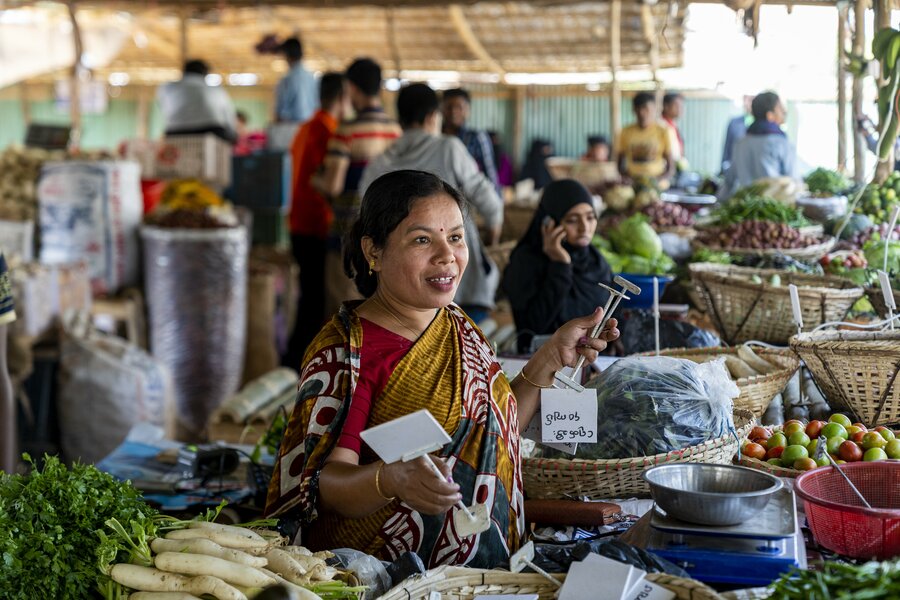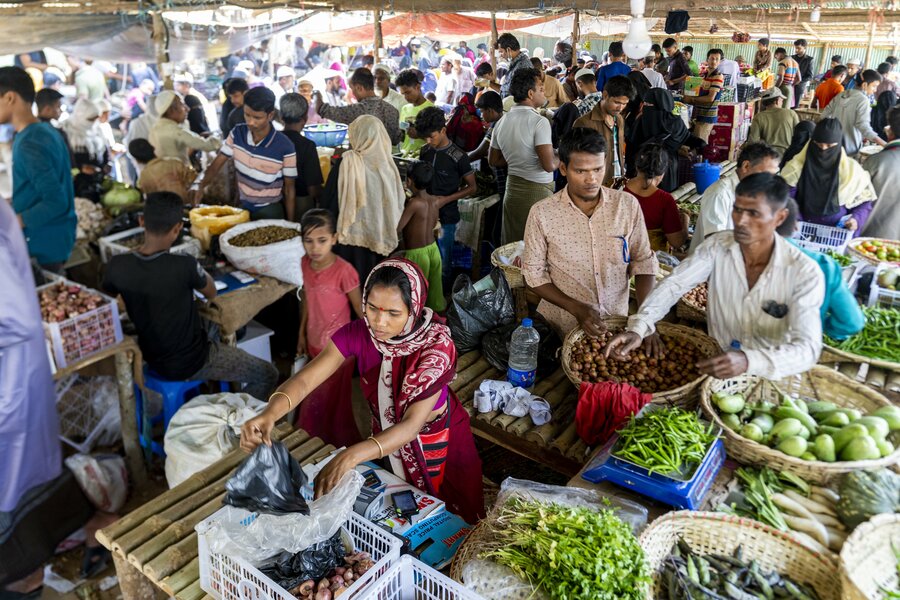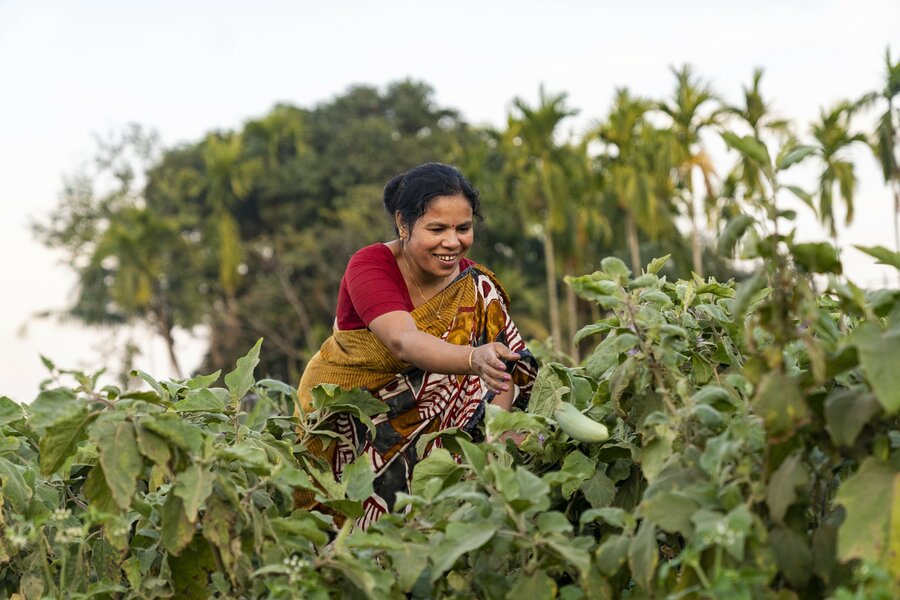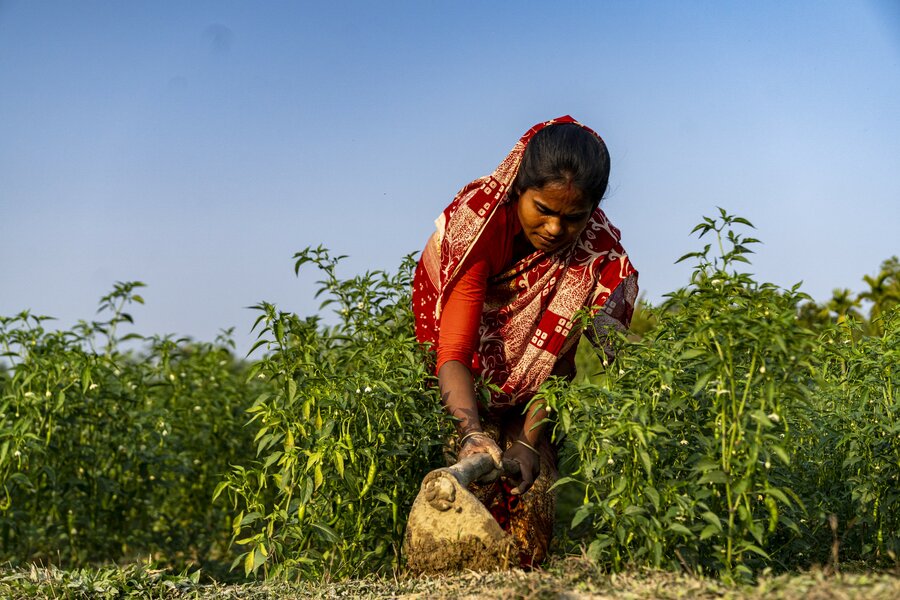Unique selling point: Women farmers in Bangladesh find buyers in refugees

International Women's Day on Sunday 8 March provides an opportunity to highlight the vital role of women in helping achieve zero hunger. For related stories visit Insight.wfp.org
"I am very happy since I started going to the Farmers' Market," says Mithu Barua, a farmer empowered by a World Food Programme (WFP) project to sell her produce in Kuputalong camp in Cox's Bazar, Bangladesh. "At times, if I have any loss, I feed bad. But I am happy today because I had a good sale today."
Kutupalong is home to the world's biggest refugee camp. Around 255,000 Rohingya refugees receive bulk food assistance from WFP every month, including rice, lentils, and fortified vegetable oil. Now a new farmers' market is giving them access to more fresh produce, including vegetables, fruit, fish and chicken.
The market's rows of bamboo stalls are overflowing with the rich greens, reds and purples of fresh goods as three women hurriedly replenish their stocks and serve the growing line of customers. They are part of a cohort of farmers supported by WFP and the UN's Food and Agriculture Organization.

The dol — or team — they are part of is an all-female group of rural farmers who live in the communities near or adjacent to the refugee camps. In Bangladesh, smallholder farmers have half the access to financial services — such as microloans and national agricultural schemes — that larger farms enjoy.
Women account for more than half of all agricultural labourers, yet they have even less access to such resources and opportunities than their male peers.
"By saving the money we earn from selling crops, we have planned to ensure a good future for my kids and to build a beautiful house."
In January, a World Economic Forum report revealed the gender gap in Bangladesh for women's economic empowerment and opportunity has actually widened since 2006.
This year, 20,000 women will participate in WFP's Livelihoods Programme in Ukhiya and Teknaf sub-districts of Cox's Bazar. WFP has been working with women there since 2012, providing marketable-skills training and financial literacy, as well as business start-up grants.
When more than 800,000 Rohingya refugees arrived in this part of Bangladesh two years ago, fleeing violence in neighbouring Myanmar, there were concerns that the sudden influx would wreak havoc on markets or drive up the cost of living. As time's gone on, the refugee population has provided a unique opportunity — as a key driver of agricultural and economic development in Cox's Bazar.
In February alone, the WFP women farmers together earned more than US$15,000 from the farmers' market — that's nearly US $2,200 per farmers group just last month
A 2018 study illustrated the impact the programme has had: the average household ‘asset score' increased by 41 percent and women enrolled in the programme were six times more likely to eat healthier and reported being four times more confident than before.

Mithu Barua has been farming for years. She used to lease small pieces of land while her husband would work other people's fields to compensate their household income. Today, she grows her own crops on a bigger piece of land and invests in good quality fertilizers and farming methods. Her husband works alongside her, supporting her business.
She wakes at 5 a.m. every morning to collect the fresh produce harvested from her own farm and her team members' farms to sell in the WFP Farmers' Market. Her husband transports the produce to the market while Mithu does household chores and prepares breakfast for their two sons. She arrives to help her husband set up the farm stand before the market opens at 9 a.m.
"After arriving, I organize my shop and start the machine," she says. "I have to do everything. I don't get breaks … [but] I can bear the expenses for the education of my sons. I can eat better and can buy better clothes."

WFP assessments showed the need to improve access to quality fresh vegetables and fish for refugees. The Farmers' Market connects local farmers like Mithu, who have surplus produce, with this new base of customers, improving diets of vulnerable refugees and generating higher incomes for farmers.
It was piloted last year to improve dietary diversity among refugees and is being scaled-up throughout 2020 to reach more refugees and smallholder farmers. Rohingya people who have access to the market have US$3 per person loaded onto their WFP Assistance Card each month to use at the market which goes directly to the farmers.
In February alone, the WFP women farmers together earned more than US$15,000 from the farmers' market, selling vegetables, chicken, eggs and fish — that's nearly US$2,200 per farmers group just last month. More female farmers will join the market in March.
Women are a vital part of Bangladesh's farming communities. The Farmers' Market aims to address the deeply rooted challenges female farmers face in profiting from their labour, and bridge the gender gap which, in turn, benefits whole families.
"My husband was a day labourer when we got married. At times, he worked at the brickfields," Shikha Barua, another farmer, recalls. "He doesn't work there now. With the assistance that we got from WFP, we grow crops and are living happily with the income. By saving the money we earn from selling crops, we have planned to ensure a good future for my kids and to build a beautiful house."
The Farmers' Market pilot project is funded with support from Denmark, The Netherlands, the UK and US. WFP's Livelihoods Programme for women in Ukhiya and Teknaf sub-districts is supported by Australia, Canada, the UK and the US.
